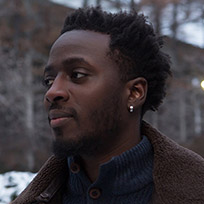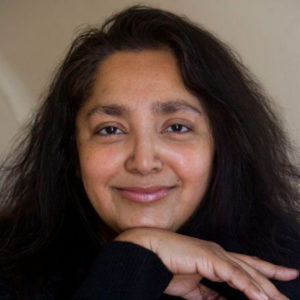 Nana Kwame Adjei-Brenyah  Chaya Bhuvaneswar |
What: Texas Book Festival 2018 program Cutting Across the Page: Short Fiction with an Edge Subject: In provocative, boundary-pushing new collections of short fiction, Nana Kwame Adjei-Brenyah and Chaya Bhuvaneswar dive deep into the territory of race, class and identity with searing narratives that cut across cultures and assumptions. What space does short fiction allow for these vital explorations? What brings these writers and their thrilling visions to this form? The authors: Nana Kwame Adjei-Brenyah - is the author of Friday Black. He's from Spring Valley, New York. He graduated from SUNY Albany and went on to receive his MFA from Syracuse University. His work has appeared or is forthcoming in numerous publications, including Guernica, Compose: A Journal of Simply Good Writing, Printer’s Row, Gravel, and The Breakwater Review, where he was selected by ZZ Packer as the winner of the 2nd Annual Breakwater Review Fiction Contest. Friday Black is his first book. Chaya Bhuvaneswar - is the author of White Dancing Elephants. She is a practicing physician and writer whose work has appeared or is forthcoming in Narrative Magazine, Electric Literature, The Rumpus, Tin House.com, Michigan Quarterly Review, Chattahoochee Review, jellyfish review, aaduna, and elsewhere, with poetry in Indolent Books/ What Rough Beast, Quiddity, Natural Bridge, Ithaca Litv, apt magazine and Hobart. She is a MacDowell Colony fellow and received scholarships to the Muse & Marketplace and Squaw Valley Writers Workshop. Her work has received several Pushcart Prize anthology nominations. |
|
Nana Kwame Adjei-Brenyah said his brother was murdered in the street. He said Treyvon Martin's murder had an effect on him. A friend and he distributed pamphlets on violence after that. They expected things to change, but things didn't change. Chaya Bhuvaneswar said internal oppression is inevitable when faced with prejudice. The oppressed are conditioned not to speak and reveal the prejudice put upon them. They are asked, “Why didn't you come out and tell us?” Why doesn't she come out and talk about her oppression? We are conditioned not to bite the hand that feeds us which is the same hand that oppresses us . We're seeing women's rage: yet they are expected not to speak out. Nana said he cares a lot about engaging the problems of the world. Because of that engagement, he has to deal with violence. Violence is a problem and avoiding talking about it is a problem in and of itself. Chaya said in her book she has one of her characters struggling to hold onto her mind during a gang-rape situation. She thinks about her failings and how that affects her future. There’s a sense of human vulnerability that makes us a target for physical or mental violence. We resist by questioning and holding firm. She said we need a diversity in choice. Choice and will need to be experienced. We are all really mysterious to each other. The panelists then talked about writing Nana said to not underestimate your experiences. Use those experiences. Don’t find gold, make gold. Chaya said a writer needs a hunger to know. Then write to that hunger, don’t just write what you know. Nana said as writers, we need to ring out of our characters everything we can. Show me more! Chaya recommended not to throw stuff you've written away. That old crappy story of yours might become the most important story you have. |